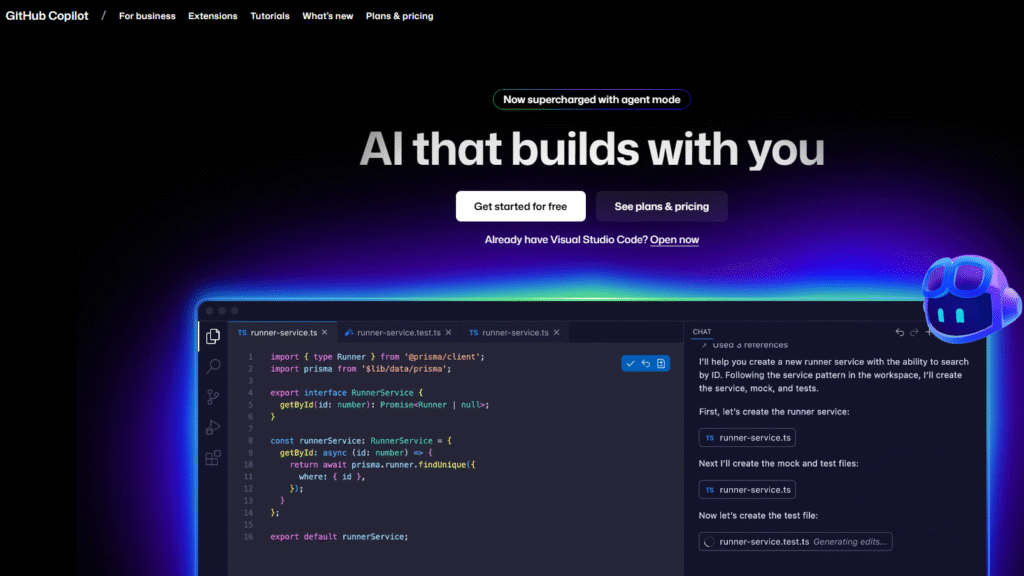In today’s fast-evolving software development landscape, AI-powered coding assistants have shifted from luxury to necessity. Two tools leading this revolution are GitHub Copilot and Windsurf. But which one truly fits your workflow?
In this GitHub Copilot vs Windsurf deep dive, we’ll explore their features, compare their strengths, and help you decide which tool can best elevate your coding experience. Whether you’re a solo developer, part of a team, or simply curious about the future of programming—read on. Your new coding sidekick might be waiting.
What is GitHub Copilot?

GitHub Copilot acts like an always-available pair programmer. Born from a collaboration between GitHub and OpenAI, it uses a powerful machine learning model trained on vast amounts of public code to provide real-time suggestions across numerous programming languages.
Its core strength lies in predicting what you’ll code next—almost like reading your mind.
Key Features of GitHub Copilot
- Real-Time Code Suggestions: As you type, Copilot offers instant and intelligent completions. It’s autocomplete—supercharged.
- Context-Aware Assistance: The tool doesn’t just guess randomly. It analyzes your open files and existing code to deliver relevant suggestions.
- Smooth IDE Integration: It works seamlessly with popular development environments like Visual Studio Code, JetBrains IDEs, and Neovim.
What is Windsurf?

Windsurf takes a broader approach. It’s not just about code completion—it’s designed to help developers achieve and maintain a “flow state.” It offers real-time suggestions, smart error detection, and contextual guidance aimed at making coding feel seamless.
As Garry Tan, President & CEO of Windsurf, says: it gives your work “rocket boosters.” It helps engineers ship projects faster and more efficiently.
Key Features of Windsurf
- Cascade: An AI agent that understands the intent behind your code. It can write tests, fix issues, and improve reliability.
- Windsurf Tab: Tracks your command history and clipboard to offer personalized suggestions tailored to your coding habits.
- Integrated Build Process: Allows you to build, iterate, and ship applications without switching contexts—reducing distractions and boosting productivity.
GitHub Copilot vs Windsurf: Feature Comparison
Let’s compare GitHub Copilot vs Windsurf in details.
Code Completion Capabilities
When it comes to code completion, both tools bring unique strengths.
GitHub Copilot excels at instant, inline suggestions. Trained on OpenAI models and GitHub’s vast code repositories, it’s excellent at predicting and generating whole lines or functions. It’s especially good at interpreting comments and turning them into code—ideal for developers who want quick, accurate completions without complex setup.
Windsurf specializes in multi-line code completion. It adapts to your coding style and past changes, analyzing syntax and project context to deliver hyper-relevant suggestions. Its fill-in-the-middle (FIM) capability is a standout for editing existing code—making it a powerful tool for maintaining and refactoring large codebases.
Terminal Command Integration
A tool’s ability to work with the terminal can significantly impact developer productivity.
Windsurf stands out here. You can describe what you need in plain English, and it converts your request into the correct terminal command. This is especially helpful for developers who aren’t terminal experts.
While GitHub Copilot offers similar features, users often report that Windsurf delivers faster and more accurate command translations—likely due to its stronger contextual awareness.
AI Chat and Assistance
AI chat features are redefining how developers debug and problem-solve.
GitHub Copilot Chat enables natural language conversations inside your IDE. You can ask for code explanations, debug, or request architectural advice. Its integration with GitHub’s ecosystem—pull requests, issues, and docs—makes it a robust tool for collaborative teams.
Windsurf’s Cascade offers two modes: a “Write Mode” for direct code edits via chat, and a “Chat Mode” for conversation-based support. It also retains session history, creating a more continuous and context-rich interaction. This makes it ideal for teams using non-GitHub or self-hosted version control.
User Experience and Interface
A good tool should feel intuitive and stay out of your way.
Windsurf’s interface is built for minimal distraction. It’s clean, integrated, and focused on helping you stay in a flow state. You can start coding quickly, with little learning curve.
GitHub Copilot also offers a clean experience, though some users find they occasionally need to manually set context for deeper suggestions. Still, it remains a powerful and widely-adopted tool with strong usability.
GitHub Copilot vs Windsurf: Pricing Plan
When it comes to pricing, both tools offer competitive plans.
Windsurf starts at approximately $15 per month, offering a compelling feature set for individuals and teams alike.
GitHub Copilot begins at $4 per month for individuals, with enterprise plans available for larger organizations.
While Copilot’s entry-tier is cheaper, Windsurf’s pricing can be more attractive for teams—especially those looking for advanced collaboration and code maintenance features without a steep investment.
Conclusion on GitHub Copilot vs Windsurf
So which one should you choose?
Think of it like this: GitHub Copilot is like a high-performance sports car—fast, efficient, and perfect if you live inside the GitHub ecosystem. It’s great for generating new code and offers reliable, instant completions.
Windsurf, on the other hand, is more like an all-terrain vehicle—versatile, adaptive, and built for complex workflows. It shines with existing codebases, terminal integration, and teams using diverse toolsets.
Your choice depends on your needs. Try both if you can—each has a free trial—and see which one keeps you in the flow. Happy coding!



